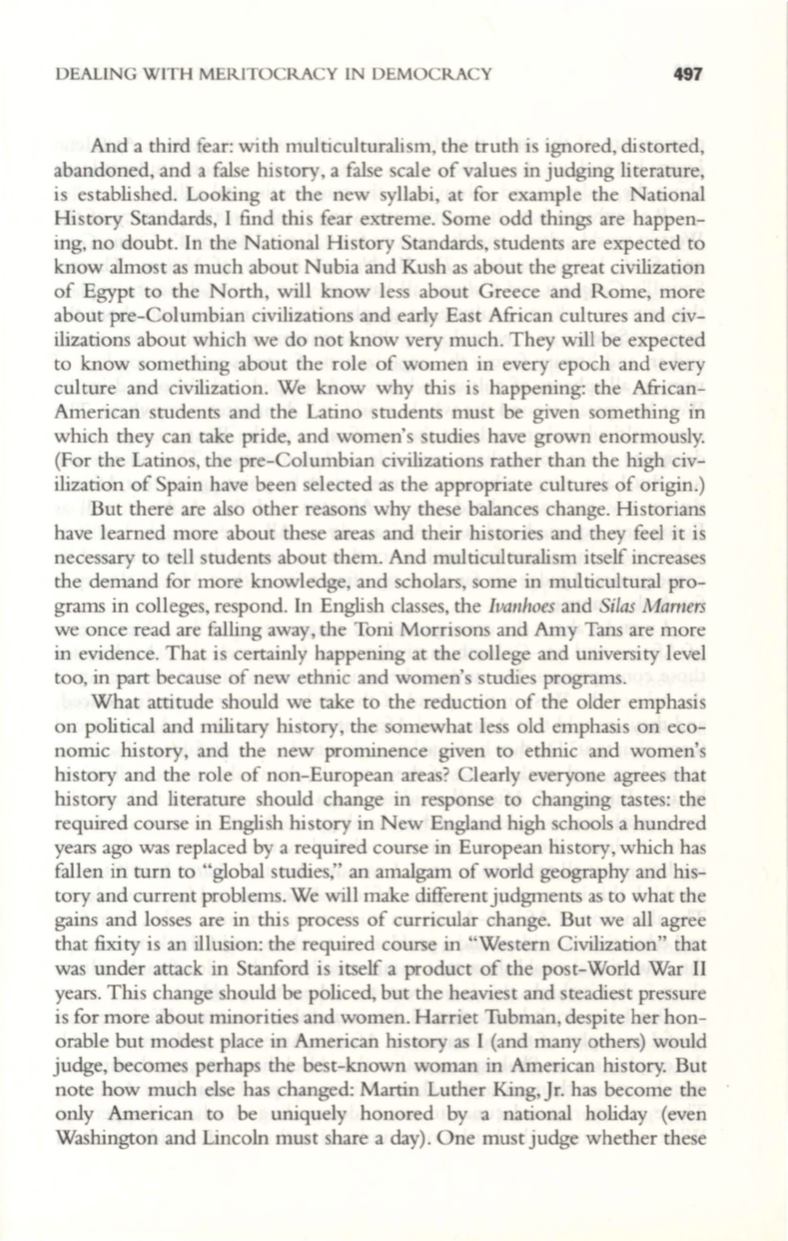
DEALING WITH MERITOCRACY IN DEMOCRACY
497
And a third fear: with multiculturalism, the truth is ignored, distorted,
abandoned, and a false history, a false scale of values in judging literature,
is established. Looking at the new syllabi, at for example the National
History Standards, I find this fear extreme. Some odd things are happen–
ing, no doubt. In the National History Standards, students are expected to
know almost as much about Nubia and Kush as about the great civilization
of Egypt to the North, will know less about Greece and Rome, more
about pre-Columbian civilizations and early East African cultures and civ–
ilizations about which we do not know very much. They will be expected
to know something about the role of women in every epoch and every
culture and civilization. We know why this is happening: the African–
American students and the Latino students must be given something in
which they can take pride, and women's studies have grown enormously.
(For the Latinos, the pre-Columbian civilizations rather than the high civ–
ilization of Spain have been selected as the appropriate cultures of origin.)
But there are also other reasons why these balances change. Historians
have learned more about the e areas and their histories and they feel it is
necessary to tell students about them. And multiculturalism itself increases
the demand for more knowledge, and scholars, some in multicultural pro–
grams in colleges, respond. In English classes, the
Ivanhoes
and
Silas Mamers
we once read are falling away, the Toni Morrisons and Amy Tans are more
in
evidence. That is certainly happening at the college and university level
too,
in
part because of new ethnic and women's studies programs.
What attitude should we take to the reduction of the older emphasis
on political and military history, the somewhat less old emphasis on eco–
nomic history, and the new prominence given to ethnic and women's
history and the role of non-European areas? Clearly everyone agrees that
history and literature should change
in
response to changing tastes: the
required course in English history in New England high schools a hundred
years ago was replaced by a required course
in
European history, which has
fallen in turn to "global studies," an amalgam of world geography and his–
tory and current problems. We will make different judgments as to what the
gains and losses are
in
this process of curricular change. But we all agree
that fixity is an illusion: the required course in "Western Civilization" that
was under attack in Stanford is itself a product of the post-World War II
years. This change should be policed, but the heaviest and steadiest pressure
is for more about minorities and women. Harriet Tubman, despite her hon–
orable but modest place
in
American history as I (and many others) would
judge, becomes perhaps the best-known woman
in
American history. But
note how much else has changed: Martin Luther King, Jr. has become the
only American to be uniquely honored by a national holiday (even
Washington and Lincoln must share a day). One must judge whether these


